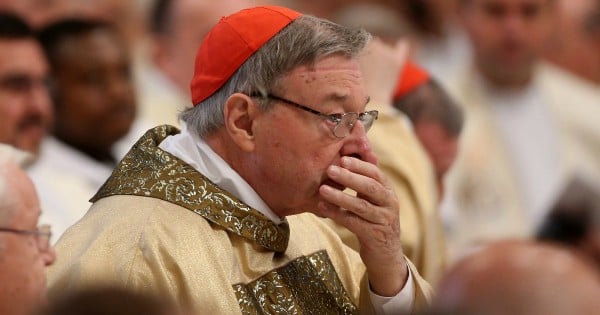
Victims of abuse have flown from across the world to testify – but the man who allegedly protected sex offenders is a no-show.
It has given a voice to the most vulnerable victims of the most abhorrent crimes.
Children who were sexually abused in schools, churches, sporting clubs and other organisations that were meant to keep them safe.
It has uncovered story after story, of lives, families and futures destroyed.
It has given victims an opportunity for closure that has eluded many of them for decades. In the tiniest of ways, it has given victims a long overdue opportunity for redress.
The Royal Commission into Institutional Responses to Child Sex Abuse has done all of these things.
But Cardinal George Pell is too sick to turn up to the Commission and explain why the Catholic Church appears to have been complicit in ruining so many lives.
The Royal Commission into Institutional Responses to Child Sexual Abuse was set up in 2013 to investigate the hundreds and thousands of Australian children sexually abused within institutions and to examine the way those institutions responded.
The Commission has found that, too often, organisations failed to report allegations to police. They failed to hold perpetrators accountable. They failed to take complaints seriously.
The Catholic Church is one of those Institutions. In particular, Cardinal Pell had been called to respond to allegations that he tried to induce David Ridsdale, the nephew and victim of notorious pedophile priest Gerald Francis Ridsdale, to keep quiet about his abuse.


Top Comments
Call for removal of Government funding and catholic churches tax free status, plus a thorough audit of its government funding.
Federal and State Government funding to Catholic Church must be audited and Church's tax free status must be investigate.
The Australian Government provides tax free status to the catholic church and Federal and State governments fund the catholic church for Education and Social Services.
I believe every catholic diocese in Australia should be audited and made to account for their government funding. I believe the tax payer has a right to know if funding has been redirected to pay for legal action to conceal child abuse, intimidate witnesses and threaten survivors and victims families.
The Church has failed to carry out its obligation to care.
It seems that the Australian community is more respectful of the right for children to be safe than than the church.
The concerned public must know who paid George Pell's legal fees of $19,000 a day?
The Royal Commission's Government legal payments for survivors and witnesses to appear at the Royal Commission was $150 per hour and for limited time.
The Royal Commission has presented us with more questions that need to be asked and answered by the catholics church bishops and executives and their board and community representatives across Australia.
Ballarat hearing finishes
This is what the Catholic Church Truth Justice and Hearing Council's Francis Sullivan stated on 17 December 2015
'Sometimes words just are not enough!
At the end of another confronting and shameful public hearing for the Catholic Church the heavy sense of failure pervades our community. It is becoming an all-too-predictable scenario, in that in every case study ineptitude, maladministration, cover ups and corrupt practices have been revealed.
This miserable history cannot be denied, nor can it be rationalised away. The very fact that a faith-based institution would perpetuate such evil is incomprehensible. But it has – and now the time for reckoning has well and truly arrived.
As witness after witness fronts the Royal Commission the pretence falls away. At times the Commission's patience is clearly tested but at least the stark realities are made plain for all to see.
Of course the Ballarat component of these past three and a bit weeks of hearings is only partially completed. It will reconvene again in the New Year in Ballarat. Cardinal Pell will also be required to give his evidence, health permitting. This will be a crucial component and has already been eagerly awaited'.
A most horrific crime of the catholic church. The continued silencing of 5,000 victims in western victoria (alone), not to mention Australia wide.